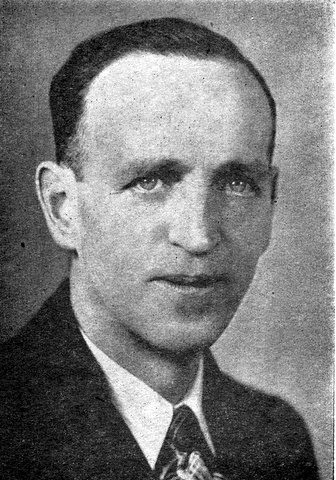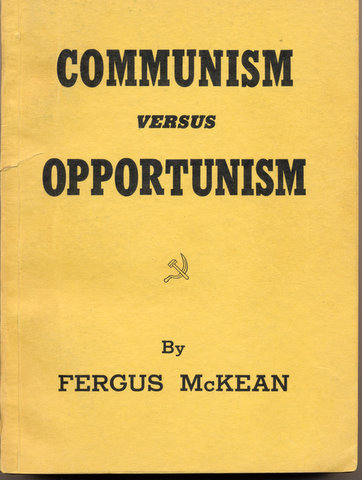
The first major attack on revisionism in the Communist Party of Canada (CPC) occurred in the immediate post-World War II period, and is linked to the name of Fergus McKean.
During the 1930s and 1940s, the Communist Party of Canada was heavily influenced by the Communist Party of the United States. As a result, as Earl Browder, the head of the CPUSA, moved his party in an increasingly revisionist direction during World War II, many of these moves were echoed in the CPC. For example, in 1943 the CPC emerged from illegality by changing its name to the Labor-Progressive Party (L.P.P.).
An example of the new reformist trajectory was demonstrated in the 1945 federal election when national leader of of the L.L.P.,Tim Buck denounced the social democratic Co-operative Commonwealth Federation for promoting a program of “Socialism Now” (his words). He argued that calls for socialist planning would alienate the majority of the Canadian working class and instead advocated the largest possible unity against the Tories.
In April 1945, however, the international communist movement intervened to sharply criticize Browder and Browderism, particularly the 1944 decision to dissolve the CPUSA and reconstitute itself as a Communist Political Association (CPA). This intervention came in the form of an article by the French Communist Party leader Jacques Duclos, in the FCF’s journal, Cahiers du Communisme, which characterized Browderism as a “notorious” form of revisionism.

The Duclos article was translated into English and appeared in the US communist press as well as in the L.P.P.’s National Affairs Monthly in July-August 1945. The L.P.P. thereafter moved quickly to abandon Browder and endorse the Duclos line. As L.P.P. leader, Tim Buck, noted, “It must be recognized frankly that we identified with the CPA in support of comrade Browder’s ’new course’ and our evaluation of the bearing that comrade Duclos’ article has upon our own party work must start from this fact.” However, Buck and the rest of the L.P.P. leadership soon insisted that the L.P.P.’s line had been basically correct all along and declined to undertake any serious critique.
The only prominent L.P.P. leader to challenge this view and to indict the party for a fundamentally revisionist theory and practice was Fergus McKean. McKean had joined the CPC in 1932 and four years later was appointed district organizer for British Columbia. Two years later, he became district secretary. After reading the Duclos letter and reviewing the historical record of U.S. and Canadian communism, McKean charged that the L.P.P. had become little more that a “petty-bourgeois, social-democratic, parliamentary election machine.”
For his criticisms, McKean and a small handful of his supporters were expelled from the Party in August 1945. In May 1946, he published a long book, entitled “Communism versus Opportunism,” which presented his case in detail. McKean hoped that the book would rally other Canadian communists to the need for a new, anti-revisionist party. As he later admitted, however, this did not occur.
This, the first effort to build an anti-revisionist communist party in Canada, thus ended in failure.
Capitalism Unchallenged: A Sketch of Canadian Communism, 1939-1949 by Donald William Muldoon
Class Struggle, the Communist Party and the Popular Front in Canada, 1935-1939 by Martin Schoots-McAlpine

Canada’s Choice: Unity or Chaos by Tim Buck
After the War – Depression or Prosperity? by Tim Buck
Two peoples: One Land, One Future by Stanley B. Ryerson
The Labor-Progressive Party Electoral Program (1944/45)
Canada on the Threshold of a New Era by Tim Buck
Canada’s Path to Peace and Security by Tim Buck
Tim Buck Analyzes Duclos Criticism of Browder Royal Canadian Mounted Police Monthly Intelligence Report, December 1, 1945
B.C. Leader of L.P.P. Ousted Royal Canadian Mounted Police Monthly Intelligence Report, September 1, 1945
McKean Atempts Revivial of CP. of C. Royal Canadian Mounted Police Monthly Intelligence Report, December 1, 1945
Canadian Stalinist Split, Socialist Appeal, [UK] February 1946
Communism versus Opportunism by Fergus McKean
A Letter from Canada by Fergus McKean